-
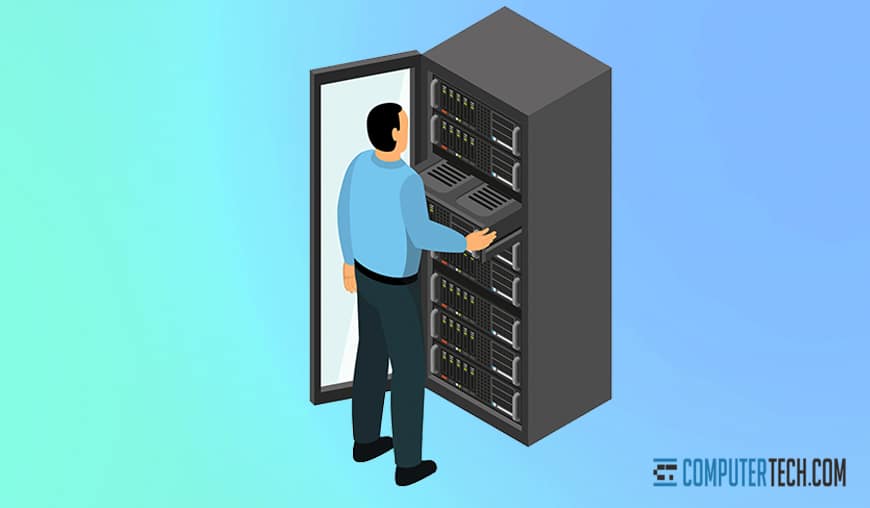
We’ve talked in the past about some of the ins and outs of using cloud hosting. We’ve also discussed the differences between hosting your own infrastructure versus using cloud infrastructure. While many businesses can be convinced that the cloud is a good choice, some prefer the control and security of running and managing their own servers.
One of the major roadblocks to maintaining your own infrastructure is, well, the infrastructure that it relies on. You might be perfectly willing to buy and maintain servers, but does your office have a high-speed internet trunk with uptime SLA guarantees? Do you have multiple redundant power sources that will keep your servers up and running even in the event of local disasters? Do you have off-site backups that can ensure data continuity in the event of a catastrophe such as a building fire?
While you may be able to guarantee a minimum amount of service in some or all of these areas, many businesses simply are not able to or have greater needs than their own infrastructure allows. As such, one service these businesses can turn to is colocation.
What Is Colocation?
Colocation, also known as colo, colo hosting, or a colocation space, is redundancy. It’s quite simple; you rent space in a data center. In that data center, you own and control the hardware and software that is in your rack space. The data center provides the guaranteed power redundancy, guaranteed internet speed and access, and other important provisions.
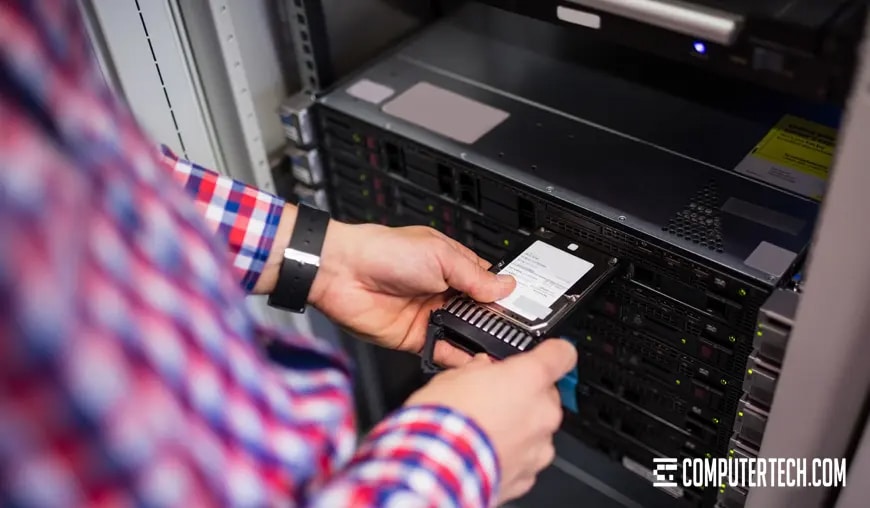
Colocation can be hands-off, where the data center offers rack space, power, and internet access, but nothing else. In this scenario, you’re responsible for monitoring, maintaining, and updating your system. You can do this through VPNs and other remote access tools, but you may also need to schedule physical access to your servers for manual maintenance.
Colocation can also be hands-on, where you own the hardware and software, but you contract the data center or MSP to manage it for you. They handle monitoring and maintaining your hardware and software, taking some of the burdens off of your organization.
How is Colocation Different from Public Cloud Hosting?
If a managed service that monitors your hardware and software sounds suspiciously like a public cloud service, you’re not entirely wrong. They are very similar, with one key difference.
With cloud hosting, you may have virtual private or truly private dedicated servers. Virtual private servers are virtual instances of server operating systems and software, many of which are hosted on one physical server. Multiple businesses can all be running virtual instances on one shared server or network of redundant, mirrored servers. With dedicated private servers, you rent the hardware and software solely for yourself; the entire capacity and capability of the server is dedicated to your use.
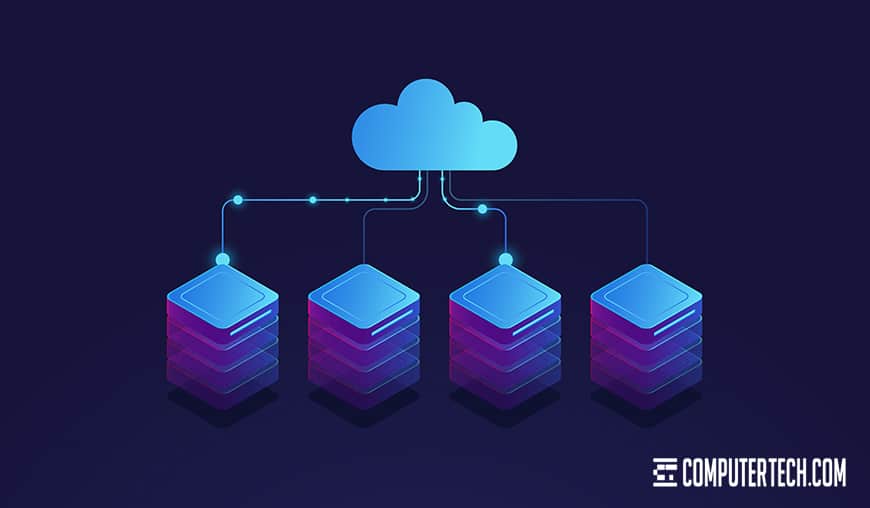
With colocation, rather than renting a full server or a virtual instance on a shared server, you actually own the hardware. The colocation provider offers its dedicated power, internet, and safety mechanisms. They also probably offer their racks and security hardware for physical security. The actual servers, however, are yours. You buy them, you own them, you decide when the hardware is updated.
Types of Colocation Services
There are generally three categories of colocation available to a business. The differences come down to how the hardware and software are managed.
Self-managed colocation services are businesses that are largely hands-off. They provide the server rooms, climate control, power, internet access, and racks. You provide the hardware, the software, the configuration, the monitoring, and the updating. Anything that needs to be done to your servers, you do.
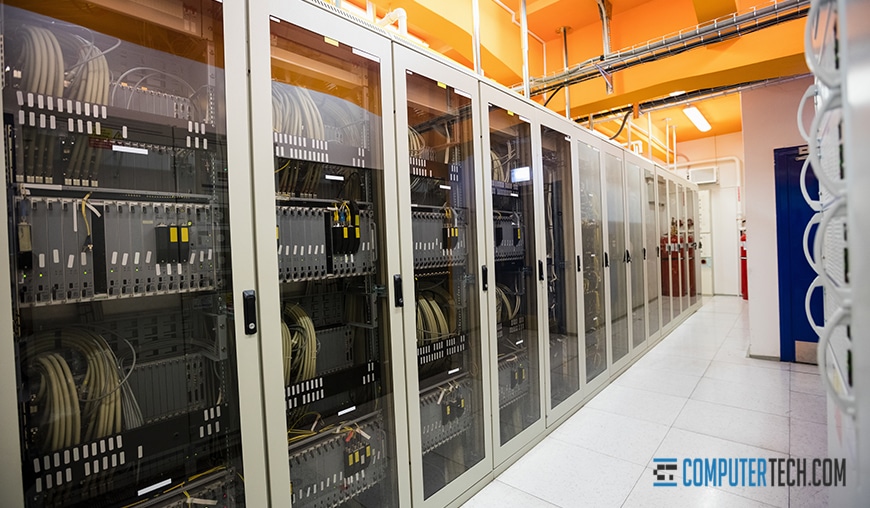
This option has the benefit of being primarily secure. No one else has access to your servers, either digitally or physically. The colocation provider may have emergency access to your servers in the event of a fault that threatens other servers in the server room, but generally, they can only unlock your rack when you’re there to do your maintenance.
On the other hand, this is the most labor-intensive version of colocation. You have to monitor your servers. You have to install and configure them, which can be quite difficult unless you have staff who are experienced in setting up apache, Nginx, *nix, and any additional software you’re using. You’re fully responsible for monitoring hardware faults, updating and replacing hardware, and maintaining your software.
Datacenter colocation management is a middle of the road style of colocation service. These data centers provide colocation services, and also offer their own services such as an MSP to monitor and manage your hardware. They generally leave software management to you but will be available to monitor the hardware, process upgrades and updates, replace broken or faulty parts, and make emergency repairs faster than it would take your employees to drive in and do the work themselves.

This choice is generally good if you have uptime needs and SLAs that specify fast reactivity to issues. A data center management team can react faster to in-house hardware issues than you can, and they can even keep a stock of spare parts on hand for emergency repairs, even temporary repairs.
On the other hand, these services typically charge by the hour of service and can rack up quite the invoice in the already stressful event of a failure. They also generally still require you to manage your own software, which means you need the same slate of server IT administrators to handle it.
Remote/On-Site IT management is adding a middleman to the equation. Generally, this instance involves contracting with two companies; the data center itself and the IT management company or MSP. The data center provider treats your contract the same as a self-managed colocation service, where they provide the infrastructure and you provide the hardware, software, and management. The difference is, the MSP you contract does that hardware and software management and monitoring.
This is the easiest method for businesses that don’t want to maintain their own IT team, or who want to streamline the staff they have. It’s also a good way to gain access to monitoring and services you can’t or may not want to pay for internally.
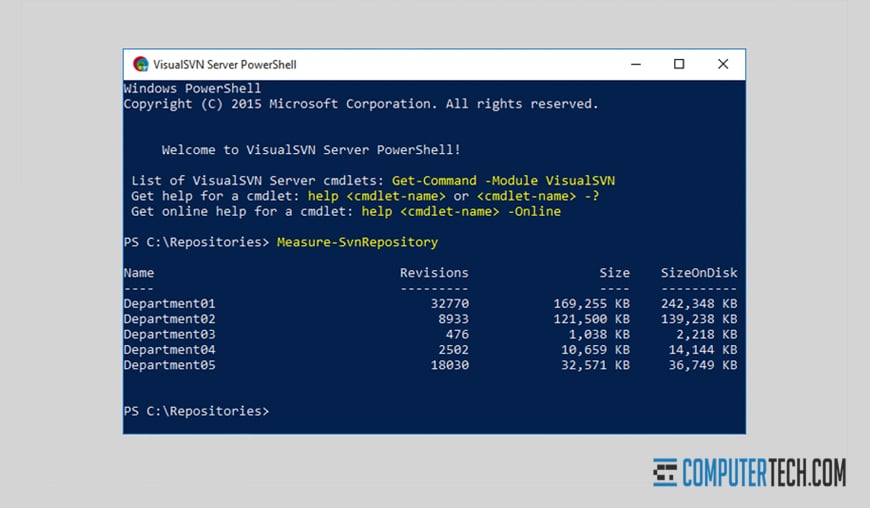
Conversely, this typically means paying two companies instead of one. The flat fee for the data center is one component, and the MSP usually charges by the hour of service. The MSP may be cheaper than the middle option of a data center management plan, but the costs can vary depending on the fees of both companies. Of course, sometimes these are bundled together into one package as well, while the MSP pays for data center access and you pay them for it as part of your total package.
The biggest potential downside to this option is that you may lose some of the benefits of colocation in the first place, namely secure and restricted access to your own hardware. For most businesses, hiring IT help is not a concern, but if your server contains highly confidential information like health records or legal documents, you would have to exercise extra caution. As far as privacy is concerned, there’s not a lot of difference between a managed colocation setup and a public or private cloud setup, other than ownership of the hardware itself.
Picking the right level of management to suit your business needs can be a complex decision, and we’d be more than happy to discuss it, as well as the pros and cons of colocation as a whole.
New Jersey Colocation Providers
The world of data centers includes far more than just giants like Google, Microsoft, and Amazon. There are dozens of companies in New Jersey alone who offer data centers with a reliable infrastructure that you can use for server colocation. Here’s a sampling of those services.
Note: we have not worked directly with these companies and cannot vouch for the quality of their services. If you have and would like to leave a review or would like to add a company to the list, feel free to post one in the comments below.
NYI New Jersey – New York Internet maintains a presence in New Jersey and offers colocation services for customers throughout the United States. They serve a variety of industries and offer specialized services for companies in healthcare, legal, and governmental services where regulations must be followed.
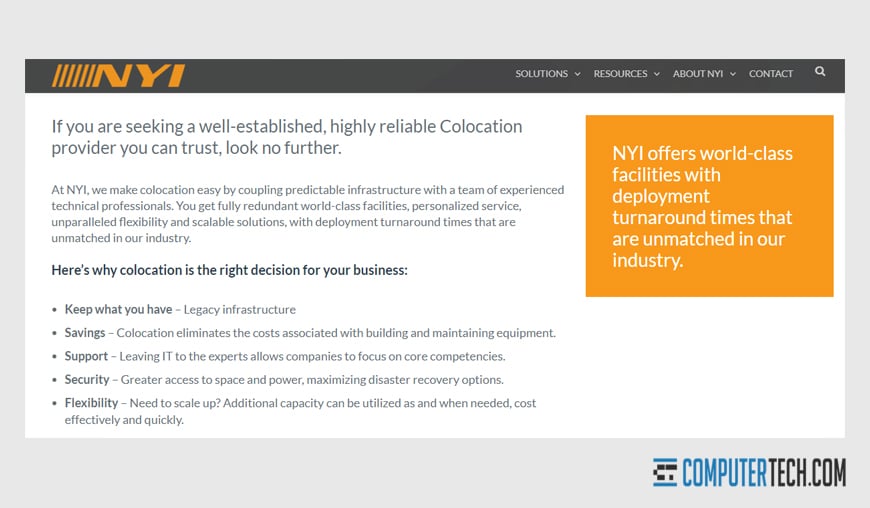
365 Data Centers – 365 Data Centers offers data center services located in thirteen different cities across the United States. They boast a more than ten-year history of 100% uptime and a continued 100% uptime SLA guarantee. Their New Jersey facility is located in Bridgewater.
Iron Mountain – Iron Mountain offers data centers around the world, as far afield as Singapore and Amsterdam, and as close to home as Edison. The company is the go-to colocation and data center company for many of the Fortune 1000, with top-of-the-line security.
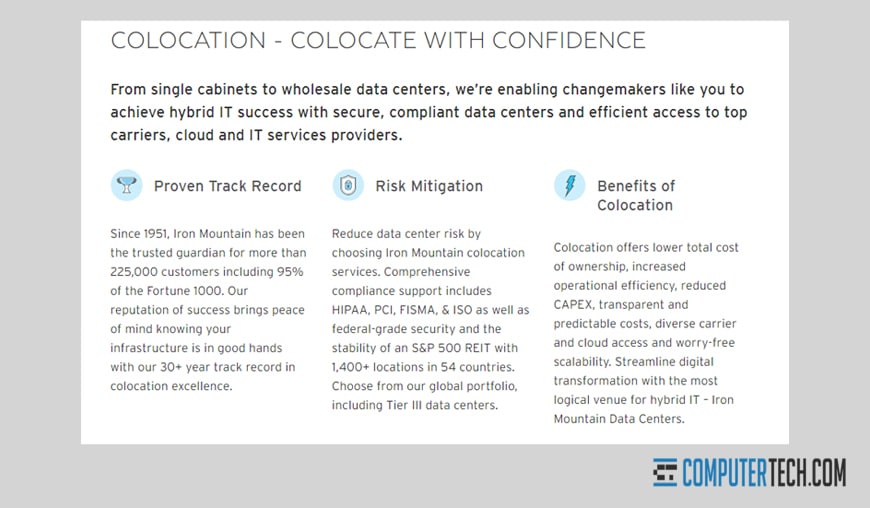
Atlantic Metro – Focusing primarily on the east coast, Atlantic Metro has not one, but four different data centers throughout New Jersey. They have direct access to trans-Atlantic fiber communications channels and have a variety of flexible and scalable offerings.
Sungard AS – Sungard offers a colocation data center in Carlstadt, with a variety of services and a robust selection of infrastructure and hardware to choose from. Their data center has plenty of redundant physical and technological security measures in place, as well as robust climate control.
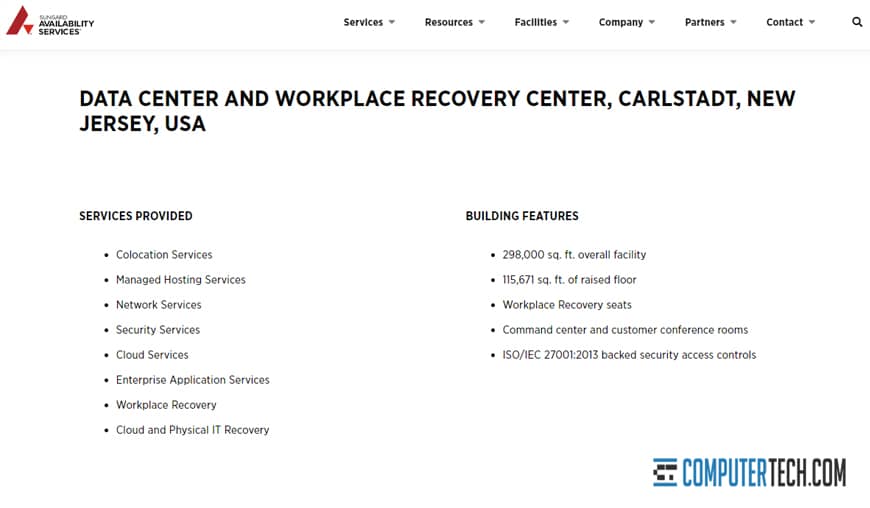
Digital Reality – Digital Reality is a top-notch colocation provider with 100% infrastructure uptime and multiple redundancies. Their secure cabinets and cages offer physical security, and they have extensive global compliance controls. They have data centers located around the world, including four different locations in New Jersey alone.
vXchnge – Located in Secaucus, this is one of the many New York-adjacent data centers operating as a hub for services throughout the country and across the ocean. The vXchnge data center is 46,000 square feet of service space, catering to New York networks and, specifically, financial institutions.
InterServer – A relatively small colocation data center compared to some others on this list, InterServer has a facility located in Secaucus as well. They have dedicated power and backups, along with roof access and 24/7 availability. Packages are available for anywhere from a single unit to a full cabinet.
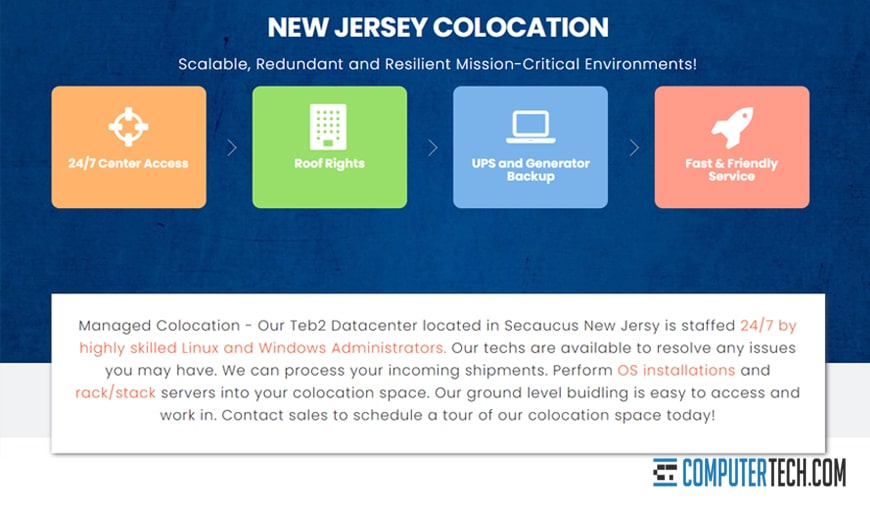
QTS – QTS offers hybrid colocation for a variety of industries in both the public and private sectors. In addition to standard colocation services, they offer sale and leaseback options for hardware. They have 21 data centers throughout the United States and two more in the Netherlands, with three of the facilities located in New Jersey.
Cologix – This company has 35 different data centers, many of which are located in Montreal or Vancouver. Four of their facilities are in New Jersey. They offer both hands-off and managed colocation services and robust facilities that can handle enterprise-grade services without a blink.
Sentinel Data Centers – Sentinel is a top-class data center provider with colocation services available to businesses of all sizes. Not only do they have rentable space in their data center, but they also segment their hardware into suites, guaranteeing no incidental access.
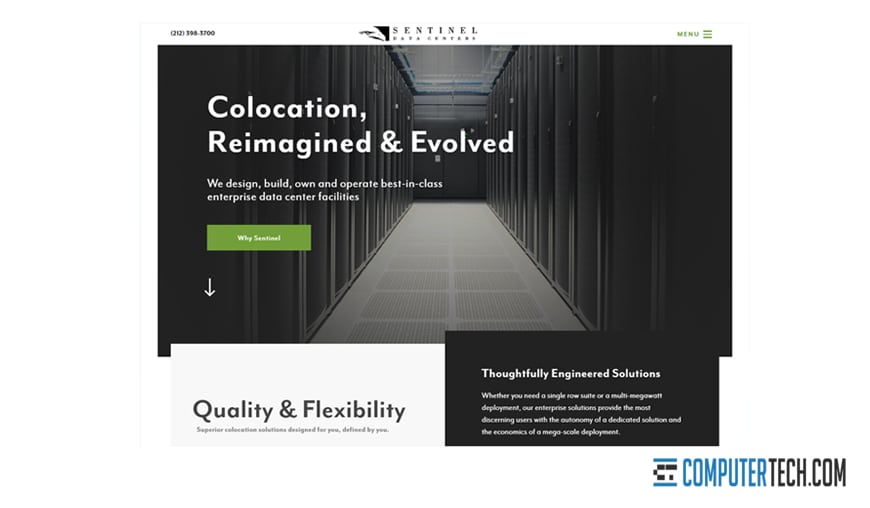
ColoCrossing – Though they label their data center a New York facility, it’s actually located in New Jersey, in Piscataway Township. This massive 360,000 square foot facility is one of many national facilities operated by ColoCrossing, all of which offer 100% uptime, enterprise-grade support, and varying levels of security and management to choose from.
24 Shells – Another Jersey-based provider, 24 Shells offers fully remote and a managed “remote hands” service for anywhere from a single server to a full rack of units to suit any business needs. Their 100% uptime SLA guarantee offers refunds should their uptime slip below the full 100%.
Constant – Also located in Piscataway Township, this data center offers colocation with an eye towards SMBs instead of the enterprise-grade and global corporations that dominate the larger data centers. You can fully manage your own colocation, or work with their on-site staff to manage installation and beyond.
These are just a sampling of the data centers and colocation providers located just in New Jersey. If you’re willing to expand your horizon to New York, dozens more open up. Additionally, many global companies such as Rackspace and Verizon offer business colocation services with New Jersey data centers. You’re free to pick from any of these companies to find the exact match of price, service, management, and security that you may find yourself needing.
About The Author
Herman
Herman is the lead team member here at Computertech.com. He’s been in IT for over 20 years and has expertise in our various IT Services including Microsoft Azure, Microsoft 365, Microsoft Teams and even Computer Security.
No related posts.
IT Support | IT Services | IT Consultant | Computer Support
Speak to a Human (856) 347-2282
- Home
- About Us
- Services
- IT Support
- Managed IT Services
- IT Consulting and Strategy
- IT Security Services
- IT Infrastructure Services and Networking
- Help Desk and Onsite Support
- Communication and Collaboration
- Specialist IT Services
- Data Backup and Disaster Recovery
- Cloud Computing
- Optimizing Network Consulting Services
- Remote Monitoring and IT Management
- Business Computer Services and Consulting
- Blog
- Contact Us
Navigation- Home
- About Us
- » About Computer Tech
- » What To Expect
- Services
- » IT Support
- » Managed IT Services
- » IT Consulting and Strategy
- » IT Security Services
- » IT Infrastructure Services and Networking
- » Help Desk and Onsite Support
- » Communication and Collaboration
- » Specialist IT Services
- » Data Backup and Disaster Recovery
- » Cloud Computing
- » Optimizing Network Consulting Services
- » Remote Monitoring and IT Management
- » Business Computer Services and Consulting
- Blog
- Contact Us
A List of Colocation Providers and Data Centers in New Jersey
In need of IT Services or IT Support? Call us today at (856) 347-2282
About Us
Computer Tech is an IT Consultant \ Computer Consultant firm providing Computer Support, IT Support and IT Services in South Jersey, IT Support North Jersey, IT Services Delaware, IT Services New Jersey, Philadelphia Pennsylvania.
(856) 347-2282Get started:
- List of Microsoft 365 Backup Services and Recommendations
- A Guide to Integrating Office 365 with Microsoft Teams
- The Difference Between Microsoft 365 Business and Enterprise
- Why Your Business Should Use Microsoft Teams Phone System
- How Much Money Can Cloud Computing Save Me Each Month?
- The Pros and Cons of Public vs Private Cloud Computing
Newsletter
Computer Tech, LLC.
105 Market Pl Suite 1, Glassboro, NJ 08028
(856) 347-2282
© Copyright 2025 HighTech Business Solutions. All Rights Reserved.



